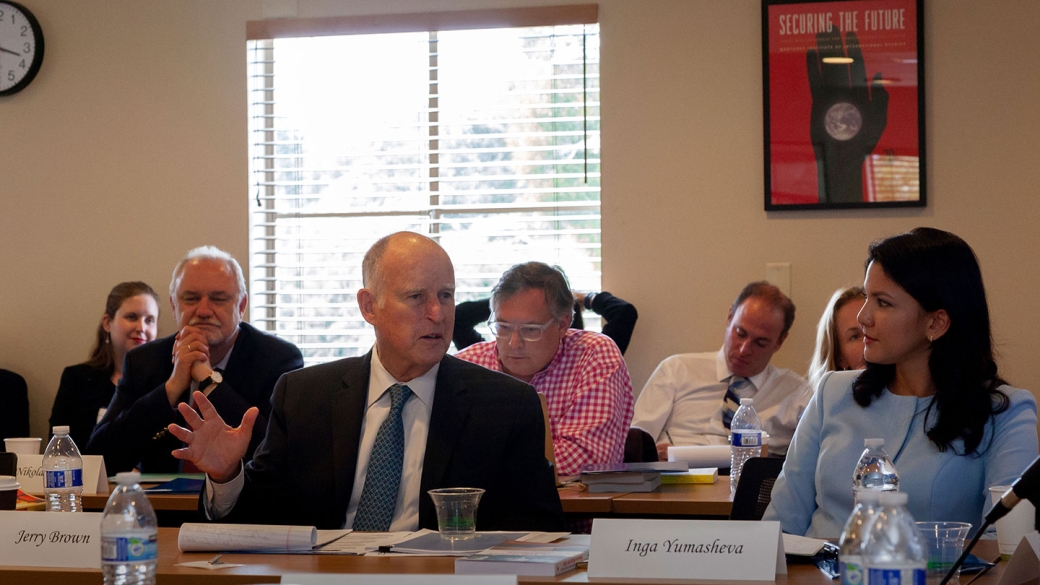Institute Hosts U.S., Russian Experts for High-Level Workshop on Nonproliferation and Disarmament

In the shadow of heightened tensions between the United States and Russia, the Institute’s James Martin Center for Nonproliferation Studies (CNS) recently hosted a high-level workshop for American and Russian experts and policy makers relations that was notable both for its participants and for its constructive and collegial atmosphere. The July 30-31 event in Monterey, which CNS co-organized with Moscow’s Center for Energy and Security Studies, included former U.S. Secretary of Defense William Perry, former Soviet and Russian Ambassador Sergey Batsanov, Congressman Jimmy Panetta, and Inga Yumasheva, a member of the Russian Duma. California Governor Jerry Brown also participated in the workshop and delivered the keynote address.
The objective of the workshop was to facilitate in-depth discussion on a host of topics relating to nuclear nonproliferation and disarmament between representatives from both countries. Over two days, the group addressed issues ranging from the future of nuclear arms control to the impact of last year’s Treaty on the Prohibition of Nuclear Weapons—the “ban treaty”—on the Treaty on the Non-proliferation of Nuclear Weapons—the NPT, which was concluded 50 years ago.
One issue where all parties appeared to agree related to the need to resume dialogue on nuclear issues between Russian and American officials at a high level. Secretary Perry drove home both the degree of disengagement between the two nuclear powers today and its potential consequences, observing that “even during the depth of the Cold War, we did not lack the dialogue we lack today.” Perry reminded the group that the Soviet Union and the United States had nearly stumbled into nuclear war several times in the past, and that only the trust and confidence established between the two countries’ leaders prevented them from making rash—and devastating—decisions on the basis of miscommunication.
Illustrative of the difficulties of re-establishing dialogue between the U.S. and Russia was the absence at the workshop of any currently-serving official from either nation with direct responsibility for national nuclear policy. Still, commented CNS Director William Potter, “This workshop meeting represented an important step toward re-establishing regular interactions between American and Russian experts on nuclear issues. The participants’ comments suggested that there are, in fact, significant areas where Moscow’s and Washington’s interests still converge in this domain.”
This workshop meeting represented an important step toward re-establishing regular interactions between American and Russian experts on nuclear issues. The participants’ comments suggested that there are, in fact, significant areas where Moscow’s and Washington’s interests still converge in this domain.
Observers noted that the lines of debate rarely seemed to coalesce around a distinctly “Russian” or “American” position. While a range of sometimes-divergent views was evident, participants noted that a former Russian diplomat and a young American researcher were as likely to see eye-to-eye on a particular issue as two experts from the same country. “The outcome was a dialogue that paved the way for a better understanding of where cooperation on nonproliferation and arms control could be possible today,” said Potter.
Workshop participants also examined how perennial challenges, such as ensuring that ostensibly peaceful technologies are not used to make weapons of mass destruction, have become more complicated with the introduction of disruptive technologies like 3D printing. In each session, U.S. and Russian experts delivered formal presentations before the floor was opened for questions and comments, resulting in lively, wide-ranging, and thoughtful discussions.
Potter offered special praise for the young Russian and American experts at the meeting for their poise and eloquence. “They have the potential,” he observed, “to replenish the depleted ranks of nonproliferation specialists in both countries and restore US–Russian cooperation in this critical domain.”
For More Information
Jason Warburg
jwarburg@middlebury.edu
831-647-3516
Eva Gudbergsdottir
evag@middlebury.edu
831-647-6606
